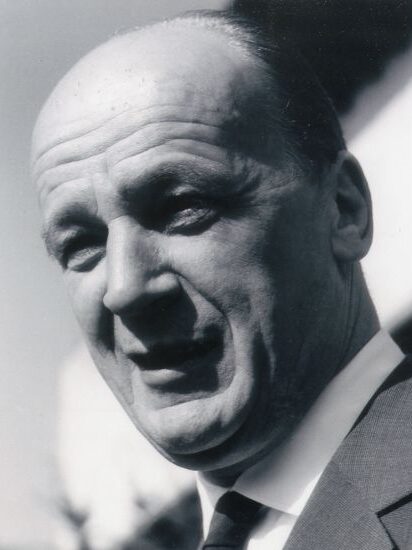Sternberger, Dolf
Political scientist, publicist
Dolf (Georg Adolf) Sternberger
Born: July 28, 1907 in Wiesbaden
Died: July 27, 1989 in Frankfurt am Main
Sternberger's ancestors were craftsmen and farmers; his father was a republican-minded book reviewer. He attended the Realgymnasium at Luisenplatz in Wiesbaden. From 1925, he studied art history, German studies, sociology and philosophy in Kiel, Frankfurt am Main, Freiburg and Heidelberg, obtaining his doctorate in 1932. From 1927 until it was banned in 1943, he was a freelancer and then editor of the "Frankfurter Zeitung". He then worked in an industrial company in Heidelberg. In 1947, he took on a teaching position for politics in Heidelberg, which eventually led to a professorship. From 1960, he held an extraordinary chair for political science and from 1962 to 1972, Sternberger was a full professor at the University of Heidelberg. In 1946, he was one of the co-founders of the local adult education center, where he was a member of the board for several years and worked as a lecturer. He was also a journalist and a permanent contributor to the "Frankfurter Allgemeine Zeitung" and co-founder and editor of the "Politische Vierteljahresschrift". He was a founding member of the German UNESCO Commission, Chairman of the German Voters' Association and President of the German PEN Center.
Sternberger is one of the founders of a decidedly constitution-oriented political science of German post-war history. He drew the conclusion from the catastrophe of Nazi rule that citizens had to take a much more active role in the political community than had been the case during the Weimar period. For him, who was married to the Jew Ilse Rothschild and had therefore been denied an academic career between 1933 and 1945, this meant not only becoming involved in research and teaching at the University of Heidelberg for the democratic state, but also appearing in public in commentaries on Hessischer Rundfunk and as an editorialist for the "Frankfurter Allgemeine Zeitung". His commentaries, for example on the Spiege affair in 1962 and the APO, are still worth reading today.
The work he wrote together with Gerhard Storz and Wilhelm E. Süskind, "Aus dem Wörterbuch des Unmenschen" (1st edition 1957, after the individual articles had appeared between 1945 and 1948 in the magazine "Die Wandlung"), analyzed the language of Nazi rule in an exemplary manner with the declared intention of freeing the German colloquial language from the new and transformed forms of Nazi language. His political positions were modeled above all on his interpretation of Aristotle's "Politics", whose model he saw in the state as a diverse community of equals. His ideal was a state built on a constitution based on fundamental rights. His coining of the term "constitutional patriotism", which triggered many discussions in public, in politics and in political education, consistently follows this conviction.
Switzerland and the USA, with their linguistically and nationally diverse populations that are held together by nothing other than their friendship with the constitution, were his role models in this respect. He called for the constitutional loyalty of citizens and their parties to be made publicly visible, thereby demonstrating that constitutional patriots form the stronger part of society. Unfortunately, Sternberger's suggestion from 1979 has yet to be realized. Sternberger has received numerous awards, including the Cross of Merit of the Federal Republic of Germany and the Critics' Prize for Literature (both in 1974), the Wilhelm Leuschner Medal of the State of Hesse (1977) and the Goethe Plaque of the City of Frankfurt (1989).
The state capital of Wiesbaden had a memorial plaque erected in his honor on May 8, 2009 at his birthplace at Lothringer Straße 28. The Dolf Sternberger Society in Heidelberg has been awarding the Dolf Sternberger Prize for Public Speaking since 1992.
Literature
Dolf Sternberger on his 100th birthday. With contributions by Ulrich Raulff, Klaus Landfried, Bernhard Vogel, Günther Nonnenmacher, William J. Dodd. Konrad-Adenauer-Stiftung e.V., St. Augustin, Berlin 2007.
